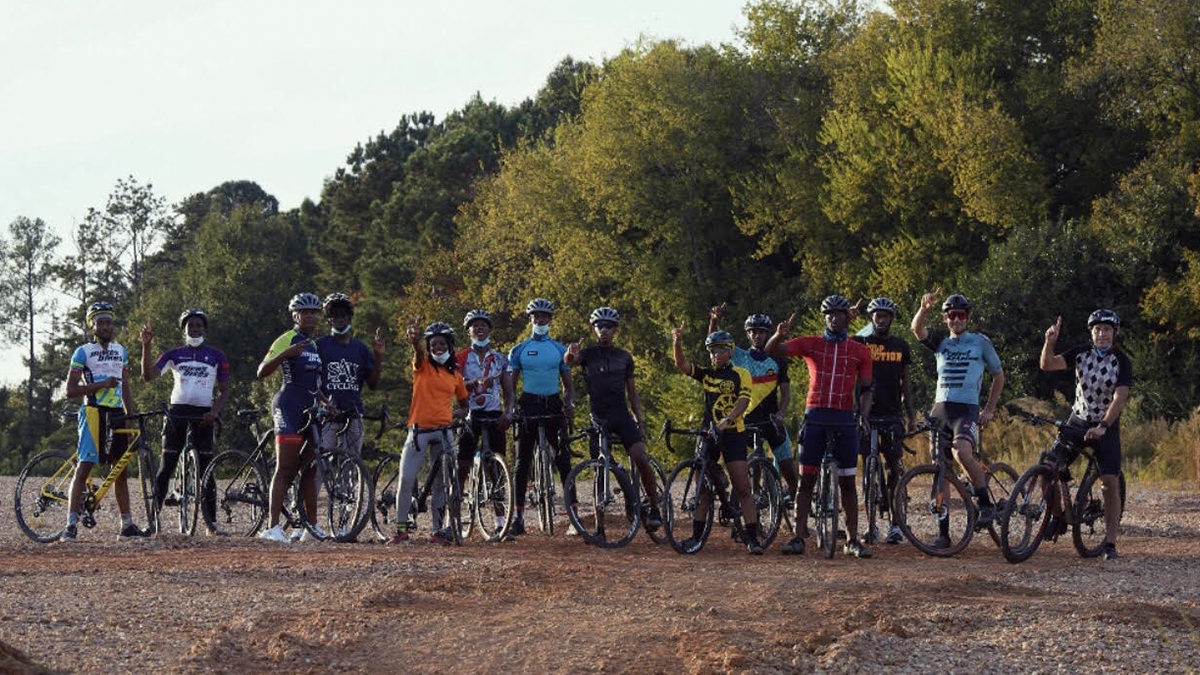Even before a riding trail had been created, the team practiced by riding through campus. That helped to inspire a few men to join the team. Then, one woman stepped up to the challenge.
“At the time, I was really the only girl that said, ‘yes,’” Lele Williams, 24, said. ”That’s why I am honored to be the captain of the women’s team because I know I am here for a purpose. I think what my purpose is to show them that they don't have to be stuck into basketball, softball or the regular sports that they’re used to seeing.”
Rather than cycling merely being seen as a means of transportation, Williams wants to transform its perception into a competitive industry. Williams, a sports management major from Tallahassee, is St. Augustine’s student government association president, a member of Zeta Phi Beta Sorority, and a player on the women’s basketball team.
“I actually lost my senior season of basketball to COVID,” Williams said. “I would say that (cycling) has filled a void for sure. I’m an athlete, and I have to have something to do. It helps with discipline; it helps with keeping myself in shape and my body healthy.”
Williams, who focuses primarily on BMX riding, realized that the sport isn’t just for the “older white generation.”
“You would think basketball would’ve prepared me for another sport when really, cycling prepared me more for basketball,” Williams said. “I don’t know if you’ve ever seen a cyclist’s legs, but they are pretty toned.”

Prior to the pandemic, the nine-member team trained behind St. Augustine’s campus on a one-mile loop of gravel, asphalt, grass and dirt. Now, though, team members are confined to training on their stationary bikes in their dorm rooms, fulfilling their 22 miles, three times a week requirement.
They practice virtually, with one live in-person practice focused on cornering, handling and other technical skills each week. Cycling, Valentine-Parris said is a “full-contact sport,” even more so than track.
“The biggest difference is the impact on your body and the intensity,” Valentine-Parris said, “You go hard every practice. You exert a lot of force and pressure on the body. My biggest issue in the transition was being relaxed on the bike and being fluid. In track, your position is calculated, like one straight line.”
After one month of training, in October 2020, Valentine-Parris competed in a three-day virtual series competition called the U.S. Cycling Collegiate Cup. Along with teammates Samuel Cudjoe and Finote Weldemariam, they cycled in a 5.1-mile timed race, a closed circuit 13.1-mile criterium event, and a 25-mile road race.
Valentine-Parris won the criterium event, bringing home his and St. Augustine’s University’s first cycling win.
“I took my win and ran with it!” Valentine-Parris said. “I was overjoyed. We started cycling a month ago and to compete with other guys who have been doing this almost all their life, I was super stoked. I think that was my turning point that I should take it seriously.”
Of the nine team members, three are women, six are men, and most are dual-athletes and involved in countless extracurricular activities. As program coordinator for the sport management academic program, Associate Head Coach Muhammad ensures students are meeting the requirements within the School of Business.
Students are expected to maintain a 2.7 GPA, but Muhammad said that most team members have maintained a 3.0. Though the students are NCAA athletes, St. Augustine’s cycling team is not recognized by the NCAA, which gives the team the freedom to be funded by bicycling sponsors, such as Major Taylor’s Association and Saris.
“Cycling is expensive,” Muhammad said. “It is as expensive as other sports that typically African Americans have not been in. Shoes are $200 or $300, competitive bikes are $3-4,000, then you have pedals and more. We don’t really have cycling in high schools, as a sport; there may be small clubs. To be honest, cycling is not a media-frenzied sport in the United States.”
Muhammad believes that while cost is a barrier, the perceived lack of monetary benefits and the lack of commercial attention given to cycling deters more Black youth from getting involved. For Valentine-Parris and his teammates, it was never about glamour, but rather impact. And as the first-ever HBCU cycling program, the potential is there.
“For me, it’s an honor just to be a part of the team,” he said. “It’s something special. I’m not an American, but I’m making American history. It’s a gift, and it’s a blessing just to be a part of it. We started the program to show that no matter where you’re from, who you are, you can be a part of something great as well.”
Though he’s anxious to begin the Spring 2021 seasons, Janas says that team has two simple goals: to inspire others and to win national championships.
“The first we can hopefully do now,” Janas said. “We’re planting the seeds now to accomplish the second.”
Ruth E. Samuel is a journalist and student at the University of North Carolina’s Hussman School of Journalism. Follow her on Twitter at Ruthesamuel.
